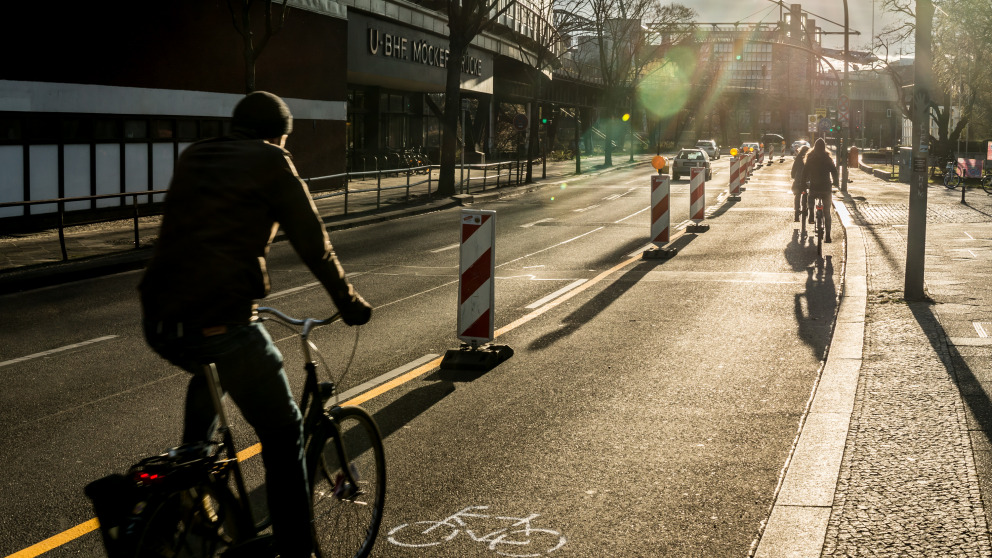Pop-Up Lanes Boost Bicycle Traffic and Air Quality
11.10.2022
In the course of the pandemic many European cities seized the opportunity to accelerate the transition towards more sustainable urban mobility. Moving with the times, planners in Berlin created a number of pop-up bike lanes. IASS researchers have examined the impact of these innovations during the initial phase of the pandemic. Their findings show that the bike lanes are widely accepted and have encouraged cycling uptake. In addition, cyclists’ exposure to nitrogen dioxide decreased with the creation of the bike lanes.

The researchers asked people in Berlin for their opinions on pop-up bike lanes and used a case study to analyse the impact of their introduction on both air quality and bicycle use. The case study focused on the busy street of Kottbusser Damm in the inner-city district of Friedrichshain-Kreuzberg, where one of the first pop-up bike lanes in Germany was installed on both sides and along the full length of the road in April 2020.
Bike lanes popular with cyclists, pedestrians, and public transport users
The survey revealed a broad split in public opinion on the new pop-up bike lanes: 95% of regular bicycle users backed the introduction of the lanes, while some 75% of pedestrians and 79% of public transport users also support the policy. By contrast, among those respondents who identify as motorists, just 15% approve of the pop-up bike lanes.

In order to understand the impact of the bike lane’s introduction, the researchers analysed data on bicycle use along Kottbusser Damm both before and after its installation. The researchers were able to source anonymized data from cyclists using the fitness tracking app Strava. While this data is not representative, there is generally a strong correlation between Strava data and official bicycle count data sets.
Analysis of this data shows that bicycle traffic increased significantly following the introduction of the pop-up bike lane, climbing by 73% over the first twelve months. In fact, a maximum increase of 141% in bicycle usage was observed in May 2020 compared to May 2019. "Pop-up bike lanes are an important measure to redistribute space in cities so that people can cycle safely. Our results show that bicycle traffic is increasing on these routes and that the pop-up bike lanes enjoy strong support, not only from cyclists, but also from public transport users and pedestrians," explains lead author Sophia Becker.
A step towards sustainable traffic planning
Air quality measurements show that cyclists using the pop-up lane on Kottbusser Damm were exposed to 22% lower concentrations of the air pollutant nitrogen dioxide than previously. Similar measurements taken on nearby streets did not indicate any reduction in exposure. According to the researchers, this suggests that the improved air quality on Kottbusser Damm is in fact due to the pop-up bike lane, rather than any citywide trend in air pollution levels.
"Our results make it clear that pop-up bike lanes can accelerate the transformation towards a bicycle-friendly city. Traffic planners in Berlin demonstrated an innovative mindset by trialling a new street layout for a limited period and analysing its usage. The lessons learned from this experiment were then incorporated into a long-term solution, significantly enhancing the outcome," explains co-author Dirk von Schneidemesser. However, it should be noted that the initial situation in Berlin‘s Friedrichshain-Kreuzberg district was more favourable than might be the case elsewhere. Civil society organisations, policymakers and government bodies were already gearing up to create new bicycle lanes ahead of the pandemic and were able to build on the momentum created by Berlin’s new Mobility Act.
Becker, S., von Schneidemesser, D., Caseiro, A., Götting, K., Schmitz, S., & von Schneidemesser, E. (2022). Pop-up cycling infrastructure as a niche innovation for sustainable transportation in European cities: An inter- and transdisciplinary case study of Berlin. Sustainable cities and society: SCC, 87: 104168. https://doi.org/10.1016/j.scs.2022.104168.
Contact

